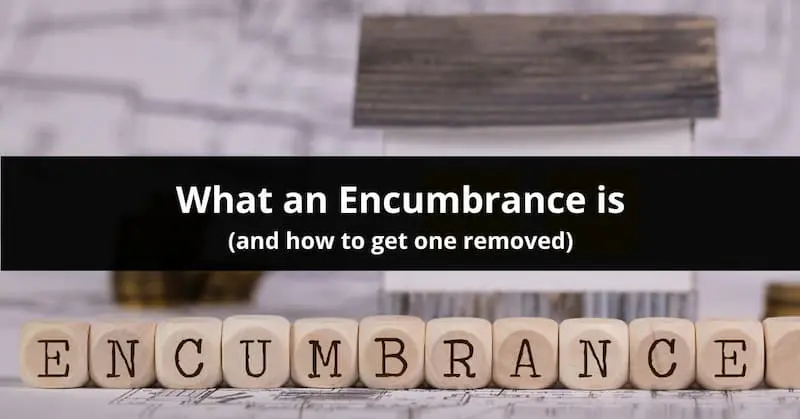An encumbrance is a limit on how a home or property owner can use their land. Encumbrances are imposed by a third party like a neighbor or your local government, and encumbrances restrict what you can do with your property. But don’t let the word encumbrance scare you, they’re very common.
Mortgages, liens, and zoning laws are all different types of encumbrances that you’ve likely already encountered. This is why it’s important to understand what an encumbrance is, the different types of encumbrances, and how an encumbrance can impact your property. Once you’re familiar with the type of encumbrance on your property, then you’ll know how to get it removed or ways to work with it.
The different types of encumbrances include:
Easements
An easement is when a person, company or organization can gain access to your property even if they don’t own it. Some common easements are utility easements (utility access to a property for water, power lines, and septic systems) and negative easements (which restricts construction to preserve a lake or mountain view).
Encroachment
Easements and encroachments often get confused. Easements give a non-owner the right to access a property that isn’t theirs while an encroachment happens when a property is being used without a homeowner’s permission.
Encroachments often end up as legal disputes like when there is a fence that sits on someone else’s property, or if a neighbor builds a shed that straddles the property line.
If you don’t dispute an encroachment, your neighbor can later claim an easement of prescription.
An example of an easement of prescription is if your neighbor uses your private gravel road to reach a public road, and has been doing this for years without your permission. If you have never asked them to stop, a court may grant them a prescriptive easement. This is why it is important for you to document when/if you have asked your neighbor to stop using your property.
Liens
Liens are a type of financial encumbrance against a property, and the purpose of a lien is to make sure that a creditor, vendor, contractor, etc gets paid in full by the property owner. This encumbrance affects the title to the property, since the property can be seized and sold to pay the owner’s debt.
Two of the most common lien types are:
- Tax liens which are placed by the government to make a property owner pay their taxes.
- Mechanic’s liens which are claims on a property that a non-owner has performed services or done work on and was not paid in full.
Leases
Leases are a form of encumbrance, because the owner’s use of the property is significantly restricted by the lease agreement. For example, you cannot kick someone out of your property because you want to convert the structure, and depending on the state your property is in, you may have to respect tenants rights to “quiet enjoyment” so renovating other units may be difficult. The encumbrance of a lease is removed when there are no active leases to the property.
Zoning
Zoning laws are regulations that restrict how a property can be used, and there are different zoning categories: agricultural, commercial, industrial, recreational, and residential.
Real estate zoning laws for residential areas can limit different aspects of your property like the height of your home, the size in relation to the lot, and how much of your yard can be covered with impervious (water-resistant) surfaces.
Zoning laws also can require a permit to do modifications like replacing windows, building a fence, or adding on an addition to the home. The zoning laws can also stop a shopping mall from going up in the middle of a neighborhood or that your neighbor doesn’t build an apartment building.
An owner can request a variance to use the land for a purpose other than what was intended, but you aren’t guaranteed to get an approval.
Mortgages
The most common type of encumbrance in real estate is a mortgage. When a lender lends you money to purchase a property, a lien is placed against the property that restricts you from selling (or disposing of a property) without first repaying your loan back.
This encumbrance doesn’t affect anything unless a homeowner fails to pay their mortgage or is selling their home for significantly less than their remaining loan balance. And don’t let the “repaying the loan back” part scare you. When you sell your home, you use part of the money to pay off the mortgage and keep the rest as profit. The amount you paid off and can get back is the “equity” in your property.
One encumbrance with a mortgage is if you are facing financial hardship. You may want to try a short sale, and your lender may not approve it. If they don’t, you could wind up in foreclosure which will wreak havoc on your credit score and you’ll lose your home. To avoid this, you could sell your house for cash, but only if the “we buy houses company” can pay off the remaining mortgage by selling the house for a higher amount once they finish renovations.
The reason it makes sense for real estate investors like us is that we don’t plan on living on the property, so the sale price is profit. If you’re going to live in the property you still have to pay the mortgage back and you have to pay for the repairs. If you go into foreclosure, you lose everything vs. selling for cash which lets you have some money to move on with your life.
Restrictive Covenants
Restrictive covenants limit what kind of structures can be built on a property or how you use the property like restricting business operations, only allowing certain livestock and/or pets, or other activities).
Almost all property in the U.S. is encumbered, and some encumbrances like easements allow for public services like police, fire, and utilities access to your property to perform their duties. Property encumbrances are not intimidating, and you shouldn’t worry about them. Many are easy to get removed, and most have workarounds or don’t cause any issues with property value.


